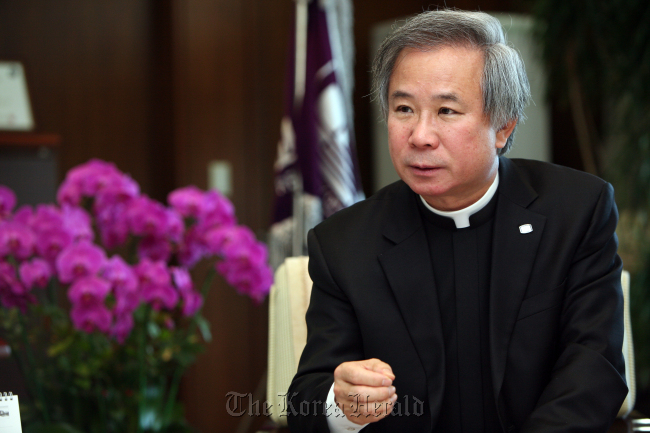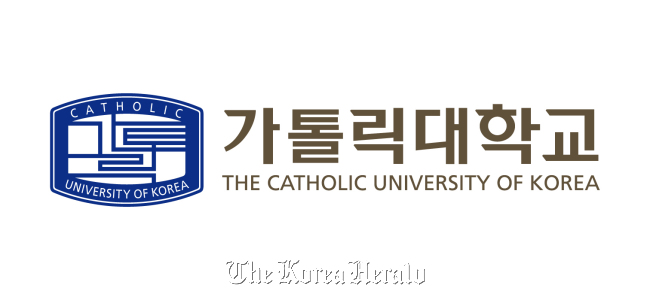Catholic University devoted to bridging Korea, world
President Pahk fosters multicultural campus, hallyu school to go global
By Korea HeraldPublished : Jan. 23, 2013 - 20:31
Introduced to Korea in 1784, Roman Catholicism triggered the first wave of modernization of the country. More than 8,000 Catholics were martyred in a century.
The Church helped reform the Hermit Kingdom in various fields including medicine, technology, social institutions and farming.
The greatest contribution that Catholics made to the country was in education, marked by the establishment in 1855 of St. Joseph’s Theological Seminary, one of its first Western educational institutions. Founded by French priest Joseph Ambroise Maistre, the school changed its name to its current one, Catholic University, in 1959, and transformed into a full-scale university in 1993.
It is not only the top academy for priests and nuns, but also provides the whole gamut of academic programs from humanities to engineering, with its medical school among the top-rated institutions in the nation.
True to its root spirit, the school now boasts a leadership role in bridging Korea and the world in education.
Harnessing its extensive network of international partnership with 143 institutions in 23 countries, the school is focusing on creating a globalized environment inside its main campus on the outskirts of Seoul to groom future leaders with a global mindset and perspective, as well as to offer international students the chance to better understand Korea.
The school also places emphasis on education and research on hallyu, or the Korean cultural wave, to sustain and expand the nation’s culture across the world.
“We aim to bring in more foreign students and faculty members to gain an edge against other schools,” Johan Pahk Yeong-sik, the president of the Catholic University of Korea, said in an interview with The Korea Herald.
“But more importantly, we focus on building a truly globalized campus to survive in this difficult time,” he added.
As part of its continued efforts in building a multicultural campus, the president opened an English-intensive dormitory at its Songsim campus in Bucheon, some 25 kilometers southwest of Seoul, in 2009.
The Cardinal Kim Sou-hwan International Center can accommodate 1,100 people. All freshmen are required to live in the state-of-the art dormitory where they are required to speak English while engaging in various clubs and social activities, the president said.
The Church helped reform the Hermit Kingdom in various fields including medicine, technology, social institutions and farming.
The greatest contribution that Catholics made to the country was in education, marked by the establishment in 1855 of St. Joseph’s Theological Seminary, one of its first Western educational institutions. Founded by French priest Joseph Ambroise Maistre, the school changed its name to its current one, Catholic University, in 1959, and transformed into a full-scale university in 1993.
It is not only the top academy for priests and nuns, but also provides the whole gamut of academic programs from humanities to engineering, with its medical school among the top-rated institutions in the nation.
True to its root spirit, the school now boasts a leadership role in bridging Korea and the world in education.
Harnessing its extensive network of international partnership with 143 institutions in 23 countries, the school is focusing on creating a globalized environment inside its main campus on the outskirts of Seoul to groom future leaders with a global mindset and perspective, as well as to offer international students the chance to better understand Korea.
The school also places emphasis on education and research on hallyu, or the Korean cultural wave, to sustain and expand the nation’s culture across the world.
“We aim to bring in more foreign students and faculty members to gain an edge against other schools,” Johan Pahk Yeong-sik, the president of the Catholic University of Korea, said in an interview with The Korea Herald.
“But more importantly, we focus on building a truly globalized campus to survive in this difficult time,” he added.
As part of its continued efforts in building a multicultural campus, the president opened an English-intensive dormitory at its Songsim campus in Bucheon, some 25 kilometers southwest of Seoul, in 2009.
The Cardinal Kim Sou-hwan International Center can accommodate 1,100 people. All freshmen are required to live in the state-of-the art dormitory where they are required to speak English while engaging in various clubs and social activities, the president said.


“In the global lounge on the first floor, students can have formal and informal meetings with faculty. Also, all conversations are held in English. Students fully immerse in the environment to be able to speak the foreign language,” Pahk said.
Pahk, who received his master’s and doctorate degrees from the Pontifical Biblical Institute in Rome, can speak 12 languages, including English, German, French and Latin.
Under the leadership of Pahk, the school also opened in September 2012 a Hallyu Graduate School, seeking to become a global hub for education and research on hallyu, a Korean cultural movement that has swept through Asia and other parts of the world.
The school seeks to provide the academic foundation to establish it as a sustainable part of global culture.
“The aim of the graduate school is to build a platform of fundamental knowledge in hallyu culture and train competent individuals who can lead a lasting hallyu culture,” he said.
The school, in particular targets diplomats, ambassadors and executives of foreign-affiliated firms who are interested in Korean culture, he added.
Courses include understanding Korea’s pop music, movies and literature, as well as getting hands-on experience of living in Korea, such as participating in a temple stay and visiting traditional markets.
“In order to promote Korea’s competitiveness through cultural promotion, the CUK will strengthen systematic education and research on the hallyu culture,” he said.
Another priority for the president is enhancing ethical education, which lags behind as schools rush to turn out competitive talent.
“I am concerned about seeing that many universities tend to focus only on students’ academic and career development, renouncing the education of the whole person.
“But at the Catholic University, ethics is a part of every course in our program,” he added.
In his view, Korea needs more leaders who can harmonize conflicting interests and opinions in an increasingly competitive society.
With the mottos of truth, love and service, the CUK has prioritized the ethics of students within its academic philosophy.
Pahk pointed out that programs such as the Ethical Leaders Rearing Program, or ELP, help to foster leadership of communication and unity of students.
Under the ELP, students are required to complete at least 70 credits in integrated liberal arts courses, including anthropology, religion and even a problem-solving course.
“It is my goal that as the president (of the CUK), even if my term is for only today or for more than a hundred years, to produce graduates who can contribute to society,” he said.
After starting at the CUK as a religion professor in 1997, Pahk was inaugurated as the school’s president in January 2009. He won his second four-year term in December last year, becoming the first president in the CUK’s history to serve consecutive terms.
The 59-year-old is also a well-known biblical scholar. Pope Benedict XVI appointed him as an executive of the Pontifical Biblical Commission, the first Asian to be appointed to the post. He had also worked as a secretary to the late Cardinal Kim Sou-hwan.
Presently, the CUK consists of three different campuses: the Songeui campus in Seocho, southern Seoul; the Songsin campus in Jongno, central Seoul; and the Songsim campus in Bucheon, Gyeonggi Province.
The Songeui campus specializes in medicine and nursing, while the Songsin campus is designed to nurture priests. Songsim, the CUK’s main campus, includes arts and humanities, sociology, international studies, environmental, life sciences, engineering and pharmacy.
Notably, the CUK has been a leader in medical research development in Korea since the medical department opened in 1954.
With the established medical college and eight affiliated hospitals, the president said the school is taking one step further toward a “medical hub” model.
By integrating biotechnology, medicine and pharmacy, the school aims to create a leading medical and biotechnological hub, according to the president.
“We are all in a dire situation. (Universities in Korea) can’t survive if we don’t shift fast enough to meet the needs of our ever-changing society,” he said.
Pahk acknowledged that the student population will decline sharply from 2015 due to the country’s low birth rate, which will force many schools to merge or close down in the next five years.
“But I’m confident about the future of our school, because we’ve been always evolving rapidly in the face of new challenges,” he said.
“And we’ll continue to play a leading role in the formation of truly talented persons who can serve society,” he added.
Johan Pahk Yeong-sik
● Pahk was inaugurated as the president of the CUK in January 2009, and was elected for his second four-year term in December 2012. He has served as a professor of religion at the CUK since 1997.
● He was ordained as priest in 1982 and worked as a secretary to the late Cardinal Stephen Kim Sou-hwan. He received his master’s and doctorate degrees from Pontifical Biblical Institute in Rome.
● Pahk is a well-known biblical scholar. Pope Benedict XVI appointed him as an executive of the Pontifical Biblical Commission, making him the first Asian to hold the position.
By Oh Kyu-wook (596story@heraldcorp.com)
-
Articles by Korea Herald












![[Today’s K-pop] BTS pop-up event to come to Seoul](http://res.heraldm.com/phpwas/restmb_idxmake.php?idx=644&simg=/content/image/2024/04/17/20240417050734_0.jpg&u=)





![[KH Explains] Hyundai's full hybrid edge to pay off amid slow transition to pure EVs](http://res.heraldm.com/phpwas/restmb_idxmake.php?idx=652&simg=/content/image/2024/04/18/20240418050645_0.jpg&u=20240419100350)

![[Today’s K-pop] Zico drops snippet of collaboration with Jennie](http://res.heraldm.com/phpwas/restmb_idxmake.php?idx=642&simg=/content/image/2024/04/18/20240418050702_0.jpg&u=)